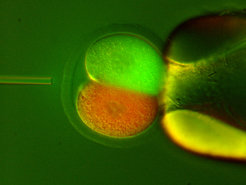Success for the reproduction biology in Münster
DFG supports with 1.15 Mio. Euros three new projects of the Max Planck Institute for Molecular Biomedicine and of the Centre of Reproductive Medicine and Andrology
In industrialized countries, the decision to have children is contiuously being postponed for various reasons and this causes fertility to drop. As a consequence, technologies of assisted reproduction and the associated fundamental research increasingly gain in importance. Yet it is unclear whether the modern methods of fertility treatment carry a risk for the development of such children. Why do malformations occur? Is, for example, the increased age of the parents responsible or does the treatment itself play a role? Reproduction scientists of the Max Planck Institute (MPI) for Molecular Biomedicine and the Centre of Reproductive Medicine and Andrology (CeRA) of the University of Münster aim to study these questions in-depth with patients and in an animal model. The Deutsche Forschungsgemeinschaft (DFG), the most important funding institution in Germany, now approved three proposals simultaneously: one project at the MPI for Molecular Biomedicine in cooperation with the University Medicine Rostock and the University of Erlangen-Nürnberg, one project at the CeRA and a joint project of CeRA and MPI. The three projects are each supported for three years; the total funding is approximately 1.15 million Euros.

After the first mitotic cell division of the fertilized egg cell, the two cells are injected with a red or green fluorescient marker. Then, the cells are separated from each other and develop independently, either in the same culture medium or in different ones. In this way, the scientists can investigate to which extent the embryonic development is influenced by "nature" or "culture".
